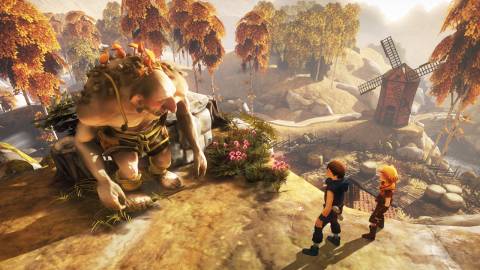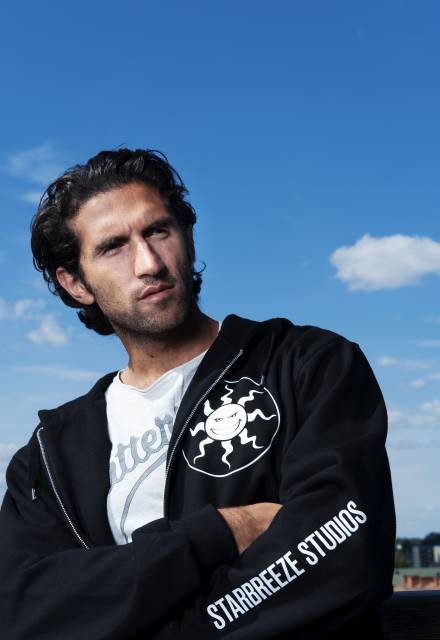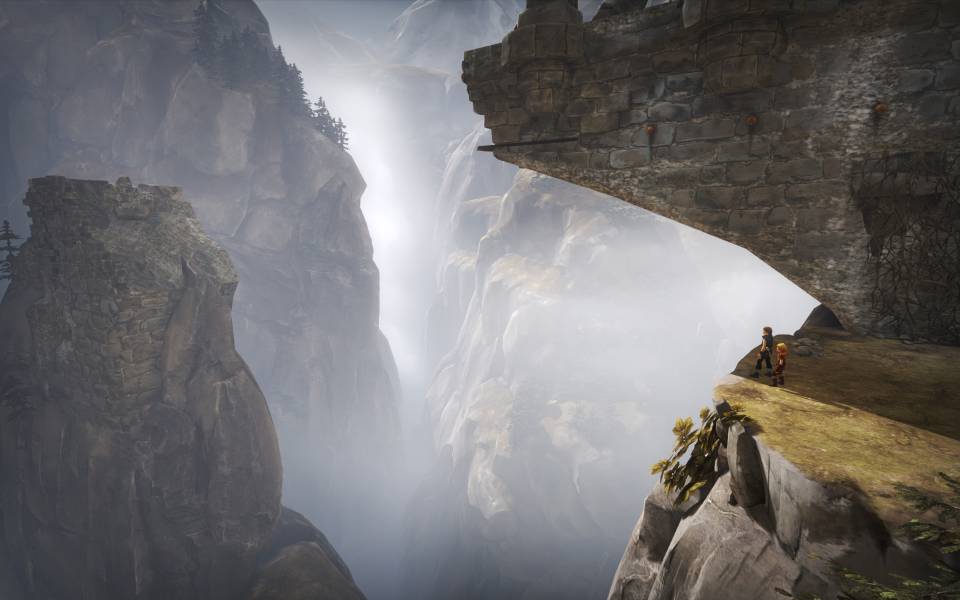Warning: This interview contains spoilers.
Have you played Brothers: A Tale of Two Sons? You should play Brothers. Right now. Seriously!

One, we’re probably going to be talking about Brothers in a few short months, as the way Starbreeze melded the game’s storytelling with gameplay is unparalleled. Even games with strong stories often struggle to do more than show the interesting bits in the cutscenes, while Brothers feels like an experience modeled from top to bottom with telling a story exactly this way.
Two, there are spoilers in this interview. I had the chance to email creative director Josef Fares, and we specifically talk about That Moment at the end. How could I pass it up? Fares isn’t a Starbreeze employee but a Swedish film director that decided to collaborate on this year's biggest surprise with the studio known for Syndicate and The Chronicles of Riddick.
I tend to pass on email interviews, since the answers aren’t usually very good. That wasn’t the case with Fares, and rather than chop everything up, I wanted to present our digital conversation in full. Hopefully, as the end of this interview teases, we’ll see more from Fares in the future. Make sure to stick around to the end, too.
Giant Bomb: How long was Brothers in development for, and can you provide a little insight as to what the original concept was? How much did it change over development?
Josef Fares: I came up with the concept of Brothers about three years ago and I knew, from day one, what the control scheme would be and how the game would end. In the beginning of development there was more combat in the game but, of course, things changes during development, we focused instead on the emotional aspect of the game.
GB: Can you talk a little bit about what originally influenced the game, games or otherwise? It has no problem switching from the deadly serious to the amazingly fantastic on a whim.
Fares: I am a big fan of the Super Nintendo 16-bit RPG era--The Legend of Zelda: A Link to the Past, Secret of Mana, Chrono Trigger, and many more. Those games inspired Brothers to be a top-down game.Another thing that inspired this game was simply that I wanted to do something new and different. My background is as a filmmaker and I truly love games, especially because they are an interactive medium, and I feel there are many things we have yet to discover about how to tell stories in games.

GB: Was it always the plan to have the brothers controlled by separate analog sticks? It's a bit like rubbing your head and stomach at the same time.
Fares: Yes, it was the plan from day one. Many people were asking me if co-op was possible but that was out of the question. The idea of Brothers is that the controller is part of the story.
GB: What kind of iteration did the control scheme go through? What changed as you started to watch people trying it out?
Fares: In the beginning, we had more buttons, but we decided early to only use one button for each brother in order to simplify as much as possible for the player, since the puzzles and challenges in the game were designed to be fun but not too challenging. One major challenge we had was how the camera should work. Controlling two characters at the same time made it very hard to figure out--we had one guy working on the camera throughout the game to make sure that every situation felt comfortable. I would say that the camera work was one of the most challenging [aspects] in creating Brothers.
GB: Can you talk about your collaboration with Starbreeze?
Fares: This is my little baby. I lived and breathed this game for two years. My normal profession is as a film director, but I put that on hold to create this game. This is really a dream come true project for me.
GB: Brothers feels just long enough. It tells the story it wants to tell, then moves on. Did you ever have ambitions of a much bigger, lengthier tale?
Fares: I think that most games today are too long and repetitive. Brothers is as long as it needs to be. I know that many people focus on how long a game is but for me how the experience feels is more important. It does not matter if the game is one hour or 50 hours.
GB: The characters don't speak a real language. Did you want to create a certain amount of distance between the player and the world?
Fares: I love the interactivity of gaming, and in Brothers we tried to make everything as interactive as possible. When you have a language that you don´t understand then the player needs to be more focused, and therefore a little more interactive, with trying to figure out on what is going on.
GB: The game climaxes during the moments when the brother dies. Everything builds to this. The controls come together, and it's impossible to imagine this scene being built any other way. Can you walk us through what it was like to write, script, and execute this moment?
Fares: This was the most important thing in the game. The challenging part was to make it as interactive as possible and make sure that the player felt something. I don´t want to talk about the ending too much but I am extremely proud that players around the world are understanding and feeling the importance of pushing LT in the end.
GB: From your perspective, as the developer and storyteller, why did the brother have to die?
Fares: I wanted the player to connect with the brothers, left hand big brother and right hand little brother. I really like the idea that you physically feel that you are not using your left hand anymore in the end. There is a reason that big brother, who you control with the left stick, dies--because people normally use the left stick to control the character. That creates an even more odd feeling when you are not using it in the end.

GB: It's been a pretty common refrain to hear that people cry while playing the game. How does that make you feel?
Fares: I am very proud of the reactions the game has elicited. It makes me and my team very happy. Many people have asked the question, “When will a video game make me cry?” It is a huge accomplishment for me that people cry at the ending of Brothers.
GB: Was is it possible to judge the game's emotional resonance during development, or does one eventually lose track after so many months of work?
Fares: Yes, it is hard to feel those emotions when you are creating the game. However, at the end of the project when we saw how things came together we knew that we had something special.
GB: Is it draining to work on a game that deals with such serious subject matter? Did you ever have to step away from the game and catch your breath?
Fares: No, not really. All the focus was on creating the best experience. But playing it today takes my breath away because of the game’s personal inspiration from my own life.
GB: More and more games are prompting emotional reactions from players. Journey and Gone Home are two recent examples. What do you make of this trend?
Fares: I love it and I hope that more games can do this. I am very happy that both Microsoft and Sony are supporting the indie community. At the end of the day, I think those games are the ones that will change the industry from a creative perspective.
"I think that most games today are too long and repetitive. Brothers is as long as it needs to be."
GB: Brothers just came out, but it's already beloved. Can we expect more projects like Brothers from Starbreeze in the future?
Fares: Hopefully. I will be able to collaborate with Starbreeze in the future on similar projects.
GB: Did you draw on any personal experiences to inform developing the game, especially in regards to the story?
Fares: This game is in many ways very personal to me. I have big brothers of my own, and a lot of the things in the game are inspired by our relationship. Another thing is that when I was young, and lived in Lebanon, I buried my newborn little brother. It was not a proper burial. Me and my sister went alone and buried him in a special place.
54 Comments